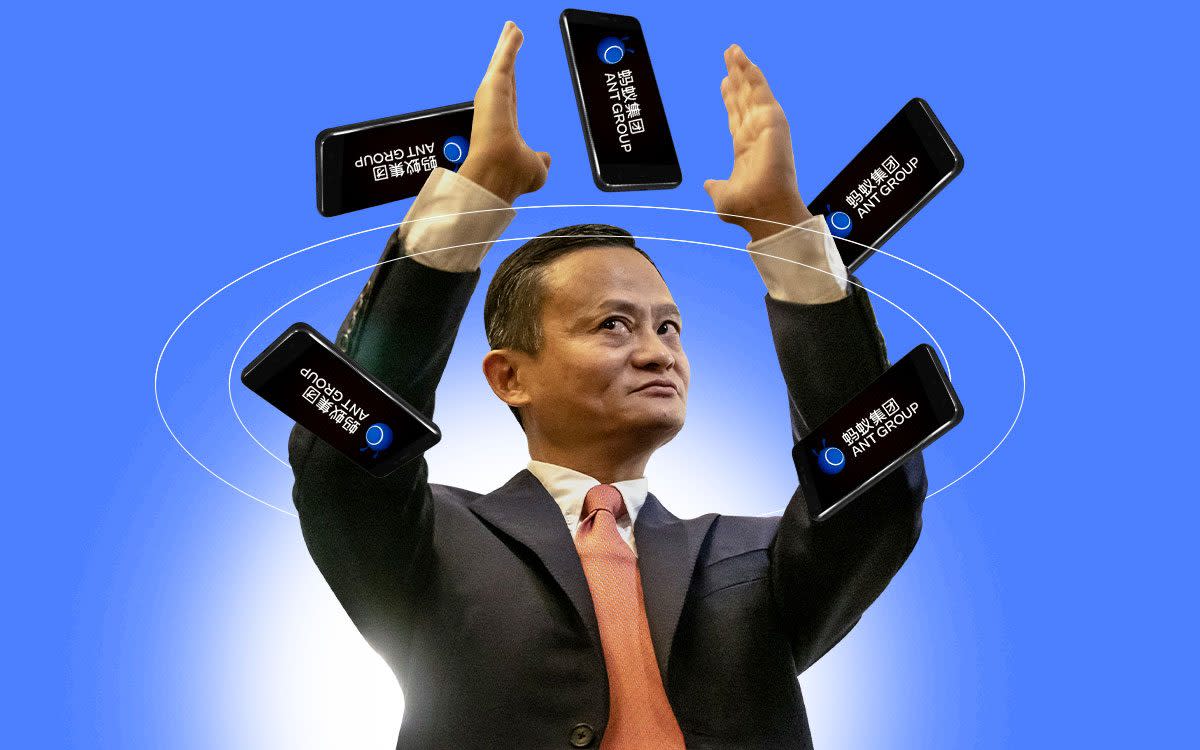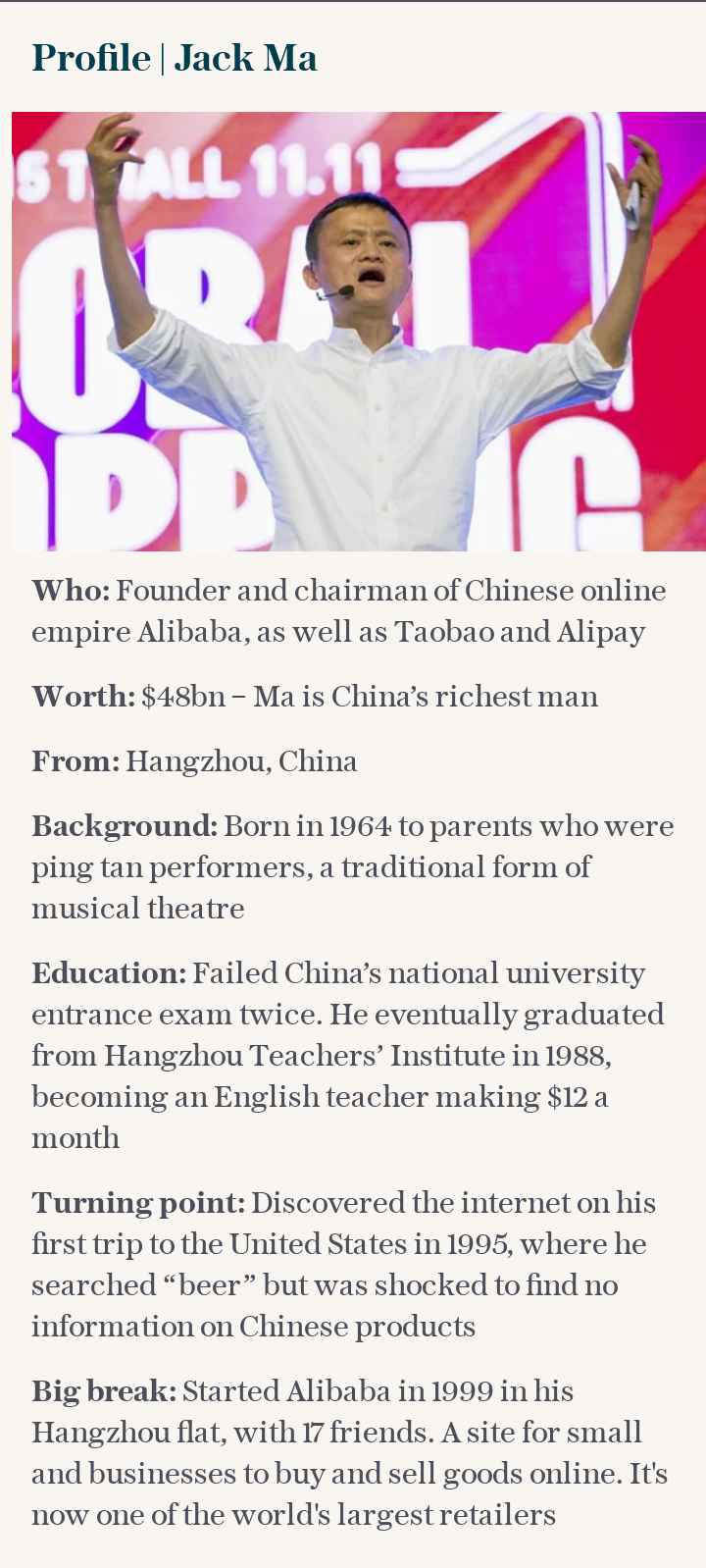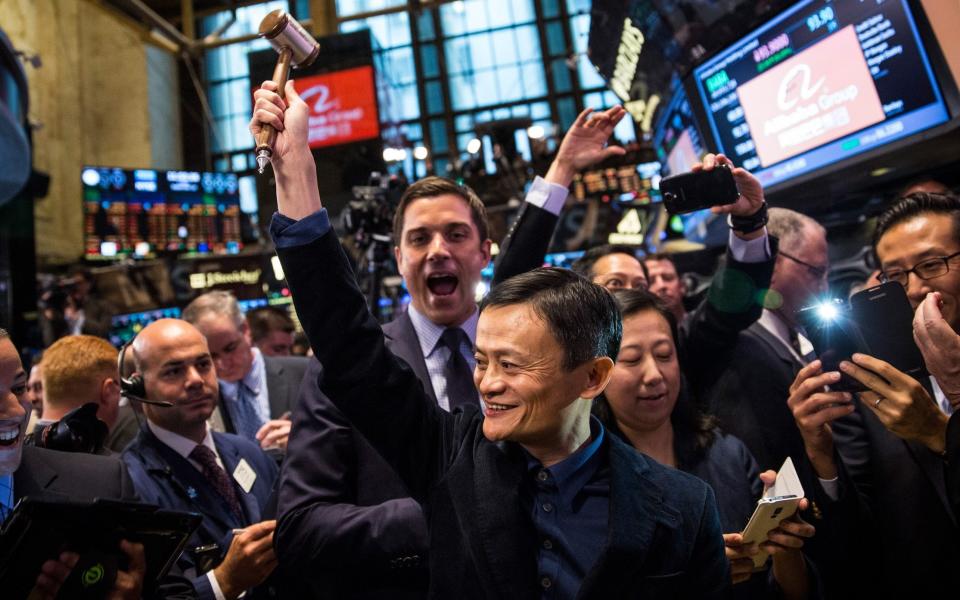Jack Ma gears up to break more records with $35bn Ant Group float

- Oops!Something went wrong.Please try again later.
Six years ago, Jack Ma was in the middle of a crowd of admiring supporters as he rang the bell at the New York Stock Exchange for Alibaba's record $25bn (£19bn) float.
Now Ma, who is worth around $48bn, looks set to break that record as he gears up for what is set to be the world’s biggest-ever initial public offering when Ant Group goes public. On Monday, Ant received bids that would value it at $35bn in a dual listing in Hong Kong and Shanghai.
There is little doubt the Chinese fintech giant is going to raise a record sum and make some investors, not least Ma who owns around 9pc of Ant, filthy rich.
Ant’s float is set to surpass Saudi Aramco’s record $29bn sale last year. The tech giant could have an valuation of at least $280bn or even as high as $320bn, making it bigger than JPMorgan and four times larger than Goldman Sachs.
“This was the first time such a big listing, the largest in human history, was priced outside New York City,” Ma said on Saturday.
But while Alibaba’s float was a high point in East-West relations, Ant is facing being placed on US blacklists. There are also concerns from analysts over the governance of the Chinese giant.
One fund manager told the Telegraph earlier this year: “It makes a lot of money. But it is not going to make money for our investors. They [Jack Ma and insiders] have all the control. If there is a breakdown between the US and China, there would be very little value to this business.”
Ant Group was founded 16 years ago as part of Alibaba, starting life as a payments processor for the giant Chinese equivalent of Amazon. This evolved into Alipay, a so-called “superapp” used by more than 1 billion people.
The app lets users send and receive money, access credit card and utility bills, trade stocks and monitor credit scores.
Three years ago, it surged from mobile into the physical world, seeing millions of merchants in China sticking Alipay QR codes in their windows and on tills. This meant consumers could scan a code and pay with their smartphone. Amid coronavirus, it has also become a key tool for China in contact-tracing and monitoring cases.
“It is hard for us to conceptualise what Ant is in the West,” says Richard Clode, of Janus Henderson, which holds a position in Alibaba. “China is an underpenetrated financial services market. Alipay is enabling global institutions to access the bottom of the pyramid that would not have been viable from an offline point of view.”

Yang Wang, a Hong Kong-based analyst with Counterpoint Research, says: “A decade ago, visiting the bank in China was hardly an enjoyable experience, involving heaps of paperwork, long queues, and questioning by many staff for even the simplest tasks. To many, access to mobile money was a far more superior experience, leading many to consider them, not banks, as the go-to place for financial life.”
This has led to explosive growth. Around $17 trillion worth of payments were processed by Ant in the year to June. Revenues rose 42pc year on year in the nine months to September when it made $17.7bn. It reported profits of $3.2bn for the first half of the year.
For now, nearly all the growth has been concentrated in China. Around 95pc of Ant revenues come from its home market and there remain questions on how easily it can replicate that overseas. While it has had some success in South Asian markets, progress in the West has been slow.
Sarah Kocianski, of fintech consultancy 11FS, notes so-called “super apps” have been successful in China, primarily because many people have had such poor access to financial products until now. She says: “They provide access to service consumers hadn’t previously been able to get. While most people in Europe… had for years been able to easily acquire a huge range of services.”
There are issues on its home turf, however. Cautious Chinese regulators have made moves to keep its growth in check. With consumers taking out short term loans through its app, Ant has been the subject of regulatory scrutiny over high interest rates, with courts expected to impose a cap.
In particular, regulators have been concerned about the “systemic risk” of Ant, given 500 million people borrowed “micro loans” through its services in the last 12 months. Regulators in China are proposing limiting how much debt such companies can raise.
There are other challenges that may give some investors pause for thought. One is governance. Jack Ma, the 56-year-old Alibaba founder, known for hosting lavish celebrations for staff and for dressing up variously as a punk rocker and Michael Jackson at company parties, has stepped back from day-to-day running. But Ant, ultimately, remains under his full control.

This control is not simply theoretical. In 2011, Ma moved to split Alipay into a separate company from Alibaba. However, he made the move without consulting his biggest outside shareholder, Yahoo!.
Yahoo! sued, and in the end secured a settlement, but that deal is likely only a fraction of what it could have made had it still held shares in Alipay ahead of its upcoming float.
A final question for investors to consider is a potential US blacklisting. According to reports, the Trump administration is considering adding Ant to a blacklist that features companies such as Huawei. It hopes to discourage US investors from cashing in on the float while also inhibiting any future efforts of Ant to expand into the US or attempt to acquire US companies.
In its prospectus, Ant said: “We cannot assure you that the current [US] export controls or economic, trade or other sanctions regulations will not have a negative impact on our business operations or reputation.”
“Governments are likely to push back on any attempts to embed a major Chinese firm into the investment and savings landscape,” says Joshua Mahony, an analyst at IG. “The proposal to add Ant to the US blacklist highlights the fact that not all nations will welcome them with open arms.”
Even if the US does attempt to impose restrictions on Ant, some analysts do not think it will halt the growth of the juggernaut. Yang, of Counterpoint, says: “We do not think this will pose a material risk on Ant… because of the company’s limited international exposure.”
The company is far from done in its relentless expansion. “We are firmly committed to advancing the digital transformation of the modern services industry, including financial services, so that every small business can reap the dividends and every individual can access services digitally at their fingertips,” wrote Eric Jing, Ant’s executive chairman.
Ant Group will list on the Hong Kong stock exchange on November 5, according to an exchange filing. A trading date for Shanghai has not been fixed.
There is still plenty of room for Ant to grow, even if it is hemmed in to its domestic market. But investors will need to be aware, it is Jack Ma who still rules this colony.

